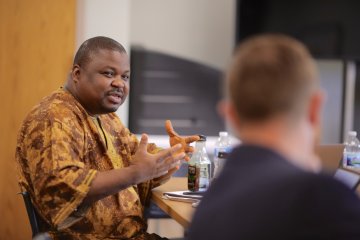5 Lessons TLI's Formal Team Learned during COVID
 Patrick J. O'Banion
Patrick J. O'BanionIn spring 2020, as the seminary that TLI's Formal Team partners with in South Asia was gearing up for the final months of their academic year and preparing to graduate the first cohort of MDiv students, the COVID pandemic hit. The country's borders immediately closed to foreign travelers. Since the school was founded in 2017, TLI staff and volunteers had taught the large majority of courses in person, but doing so was no longer a viable option. Like many aspects of our lives, we had to find new solutions in a challenging environment with limited information.
As of today, in the fall of 2021, while we are able to provide in-person instruction to all of our other partner schools, that South Asian country remains closed to us. For the foreseeable future, remote and online instruction remains the only viable option. And although we've steadily improved in our ability to deliver courses remotely, it's less fun for both teachers and students and less effective for forming pastors than face-to-face instruction. The school's second cohort of students, now at the beginning of their second year, has known only remote instruction. It's not optimal. But somehow, at least for now, it's working.
As I write, we have four instructors teaching in Liberia, and another dozen gearing up for courses in Brazil, Tanzania, Serbia, Togo, and South Asia. Each of the schools with which TLI's Formal Team partners has its own story of weathering the pandemic. Some have struggled during this season; others have unexpectedly thrived. Thankfully, none of them have had to close their doors permanently.
They say you should never waste a crisis. So, as we return to delivering in-person instruction at most of our schools, it's worth reflecting on what we've learned over the last eighteen months. Here are five of the biggest takeaways.
1. Standing up in front of students in a classroom is only a part of what it looks like to teach; that's especially true when the students are future pastors. Forming shepherds to serve Christ's church involves asking about their families and sharing about yours. It involves praying with them in ones and twos and helping them to think through discerning a call to ministry. In short, conversations during tea breaks and at meals, which seem to be marginal to the main event of classroom instruction, are actually the context where we pastor the future leaders of the church and help them to apply lessons in ways that shape their own (and their future church's) piety, practice, and theological convictions.
2. There are often better ways to do things. The Formal Team is committed to in-person, on-ground teaching whenever possible. But thanks to the pandemic, we now have a lot more experience with deploying online and remote instruction and we can see the benefit of using its strengths, particularly as an accompaniment to face-to-face instruction. Rather than parachuting in for a ten-day intensive course and then bringing the learning experience to an abrupt end as we jump on a plane to head home, we've become more open to using digital solutions to extend our interaction with students both before and after being in the country. It turns out that theological education doesn't have to be either remote or onsite. It's possible to leverage the best of both methods in powerful ways that will allow us to have an even greater impact.
3. Challenging seasons can also be seasons of growth. One of the biggest surprises has been the way in which many of our schools have thrived and sharpened their ministry vision over the last eighteen months. Several schools have more students than they did when the pandemic began. Others find that their programs now have an expanded geographical impact. One school replaced the tin-roofed classroom that had walls of woven reeds with a substantial new structure. In a number of cases, individuals aspiring to become professors have grown quickly in their teaching abilities as they have stepped in to provide face-to-face contact that we could not. We wouldn't have expected these things to happen, but God has given the increase in many ways.
4. The complex global systems that make it possible for TLI's formal team to do what it normally does are fragile. It didn't feel like this was the case until somebody tossed a wrench into the machine. Suddenly, all of the challenges that we used to face—missing a connection in Amsterdam, teaching cross-culturally through interpreters, putting up with stomach troubles, and so on—were dwarfed by the simple fact that we couldn't get there. The disruption of COVID highlights the critical need to raise up local teachers who are theologically astute, spiritually mature, and culturally insiders. Feeling a new sense of urgency to address this need, schools that we partner with in South Asia and Brazil are identifying qualified graduates and helping them to pursue terminal degrees. In years to come, this will enable them to shoulder more of the teaching load. For most of these schools, it'll take years—if not decades—to develop an in-house faculty, but COVID has increased everyone's awareness of the importance of pursuing this goal.
“The disruption of COVID highlights the critical need to raise up local teachers who are theologically astute, spiritually mature, and culturally insiders.”
5. We don't know what the "next thing" will be but we can be confident that there will be a "next thing." Human beings are finite creatures. As much as we sometimes chafe at not being able to see the future or shape the world according to our desires, God has determined that it is good for us to have definite limits. As we operate within the bounds of those limits, we seek to act with wisdom and to walk in his ways. Often, this means being both focused and flexible, preparing for the future that we anticipate and investing the resources we've been given in ways that we hope will pay dividends for the kingdom, while also acknowledging that there's a lot we don't know (Ecclesiastes 11:1–6). That means we always have to be willing to abandon what isn't working or adapt what has been working in light of changing realities. Above all, we trust that the God who promised to build his church despite all the powers of hell (Matthew 16:18) will use our efforts to that end. Pandemic or not, "Our God is in the heavens; he does all that he pleases" (Psalm 115:3).
Patrick J. O'Banion (PhD, Saint Louis University) is a former professor of history and author of several books, including Deza and Its Moriscos: Religion and Community in Early Modern Spain and a new translation of Girolamo Zanchi's The Spiritual Marriage between Christ and His Church. He currently serves with TLI, teaching future pastors and church leaders in seminaries around the world.



